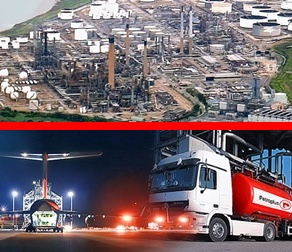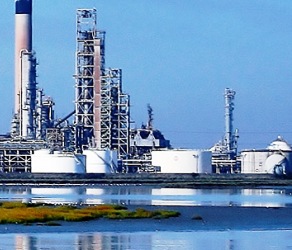Refinery closures hurt Europe's energy security
By SARAH KENT and CASSIE WERBER
LONDON -- Some of Europe's largest economies face a growing risk of fuel-supply disruptions, as commercial problems that have already driven a swath of the region's oil refineries out of business look set to intensify.
The vulnerability of the sector has drawn the attention of policy makers across the continent, with fuel security becoming a rising topic in the policy agendas of many governments and regulators. They are concerned that the need to import more fuel will mean higher prices at the pump for consumers who are already contending with a weak economy.
"If this trend continues, probably the European Commission will have to take it into account," said Pedro Miras, chairman of Spain's emergency oil stockholding agency, Cores, and chair of the International Energy Agency's standing committee on oil emergency questions. The closures "could affect security of supply, not today, but in the long term," he said.
 Europe's aging refineries have struggled to adjust to the lower demand and weaker profit margins that accompanied the economic slowdown. They have also been hit by increased competition from newer refineries in the Middle East and Asia, which benefit from lower operating costs.
Europe's aging refineries have struggled to adjust to the lower demand and weaker profit margins that accompanied the economic slowdown. They have also been hit by increased competition from newer refineries in the Middle East and Asia, which benefit from lower operating costs.
Fifteen European refineries have shut down since 2008, idling 8% of the region's fuel-processing capacity, while many others are running at reduced capacity. The result is that, even as Europe's total oil consumption has fallen, the proportion of its refined oil products that are imported has risen to 28% in the first quarter of this year from 20% in 2007, according to data from the IEA.
Now, the IEA is warning that a flood of fuel production from new plants in Asia and the Middle East could push global crude-oil processing to an all-time high of 77 million bpd in the third quarter, squeezing profit margins tighter and potentially leading to more closures.
"This could be particularly dangerous, if Europe would become entirely reliant on imports, and no longer able to support its own consumption needs," said Massimo Vacca, a spokesman for Saras SpA, which runs a 300,000-bpd refinery in Sardinia.
Italy's refiners face a "dire" situation, said Alessandro Gilotti, the president of the country's oil association, Unione Petrolifera, at its annual meeting in Rome last week. "A couple of [Italian] refiners could be closed in the next year or two with the possibility of one shutting down already in 2013."
The problem has taken on particular urgency in the UK since the sudden closure last year of the 220,000-bpd Coryton refinery near London, following the bankruptcy of its owner, Petroplus.
"The Coryton closure really stuck out in people's minds as a serious canary in the coal mine," said Alan Whitehead, a UK lawmaker in the opposition Labour Party and a member of the House of Commons Energy and Climate Change Committee. Coryton was one of the largest and most modern facilities in Europe and supplied 10% of the UK's fuel.
The UK has seen its tally of refineries fall to seven from 18 in the late 1970s. In the wake of the Coryton shutdown, the country's Department of Energy and Climate Change is reviewing the role of the refining industry in energy security and the way the country's emergency oil stocks are held.
"Security of energy supply is one of our principal policies at the Department of Energy," UK Energy Minister Michael Fallon told a parliamentary hearing Tuesday, when asked whether the loss of refining capacity could be a danger for the UK. "There's no complacency about this issue -- it's something we need to weigh very carefully," Mr. Fallon said, although he didn't see a risk of imminent supply shortages.
Other countries have had similar experiences. According to data provided by BP, the biggest loss in refining capacity between 2008 and 2012 was suffered by France, which lost 25%. Germany's has declined 12% in the same period, compared with 11% in the UK and 8% in Italy.
 This has happened in many cases despite the best efforts of European governments. The Petit-Couronne refinery in France languished on the market for 15 months as the government struggled to broker a deal to save the business. Plans for a sale eventually fell through after the final two potential buyers were deemed by a French court to have insufficient funding.
This has happened in many cases despite the best efforts of European governments. The Petit-Couronne refinery in France languished on the market for 15 months as the government struggled to broker a deal to save the business. Plans for a sale eventually fell through after the final two potential buyers were deemed by a French court to have insufficient funding.
The UK government was keen for a buyer for Coryton to be found, but ultimately was unwilling to provide the financial aid required to keep the plant running.
"All of Europe is for sale, but nobody wants to buy it," said a senior executive from the oil marketing and refining industry who didn't wish to be named.
Further refinery closures would make Europe even more vulnerable to disruption if "foreign producers will privilege their internal consumption needs, versus the continuity of exports, especially at times when they have spikes of internal demand," said Mr. Vacca, the Saras spokesman.
Higher imports could also cause prices to rise at the pump due to increased transport and storage costs, the IEA said.
But government intervention to save Europe's refining industry is a tough sell in a region suffering both a stagnant economy and sharp public spending cuts. An additional investment of $21 billion on improvements and upgrades is needed by 2020 just to keep refiners in business, according to a report published by the European Commission in May.
Dow Jones Newswires






Comments